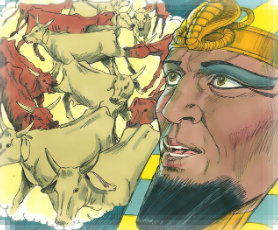
ECONOMICAL CRISIS
In ancient times, when there was a strong economic crisis caused by climate or other factors, there was a severe food shortage and caused famines. Nowadays, modernity and globalization mean that the concept of crisis has changed and if food is lacking in one country or region it can be brought from another, however there is a shortage of work, housing, etc.
The Word of God is very rich in wisdom and everything moves by God’s will, so if we want to know about economics we can also go to the Bible. In it we find what economic crises are, the times of their duration and also causes why God caused certain economic crises to occur or occur in history.
The first allusion in the Bible on this subject we have after the flood. God, after repenting of sending the flood, imposes a new order of all things and also tells us that
“As long as the earth endures, seedtime and harvest, cold and heat, summer and winter, day and night, shall not cease.” Genesis 8:22
And it is true, we have climatic cycles, and also economic ones. Some will say that he is not referring to the economy at this point, but if we consider that in ancient times everything was moved by the climate and the influence that it could have on the main productive factors that were agriculture and livestock, everything changes. Let’s analyze some examples of historical crises in the Bible:
- Crisis in the time of Abraham (approx. 2100 BC) “There was then a famine in the land, and Abram went down to Egypt to dwell there; because the hunger in the land was great. ” Genesis 12:10
- Crisis in the time of Isaac (approx. 2050 BC) “Now there was a famine in the land, besides the former famine that had occurred in the days of Abraham. And Isaac went to Gerar, to King Abimelech of the Philistines. ” Genesis 26: 1
- World crisis in Joseph’s time (approx. 1875 BC) “Now there was no food in all the land, for the famine was very severe. The land of Egypt and the land of Canaan languished because of the famine.” Genesis 47:13
- Crisis in the times of the judges (approx. 1150 BC) “In the days when the judges ruled, there was a famine in the land, and a certain man of Bethlehem in Judah went to live in the country of Moab, he and his wife and two sons.” Ruth 1: 1.
- Crisis in David’s time (approx. 1000 BC) “Now there was a famine in the days of David for three years, year after year; and David inquired of the Lord. ” 2 Samuel 21: 1
- Crisis in the times of King Ahab (approx. 875 BC) “So Elijah went to present himself to Ahab. The famine was severe in Samaria. ” 1 Kings 18: 2
- Crisis in Elisha’s time (approx. 825 BC) “When Elisha returned to Gilgal, there was a famine in the land. ” 2 Kings 4:38
CRISIS DURATION
It is true that the cycle lengths are highly variable and depend on many factors, but in the Bible it details how a complete 14-year cycle would occur.

In the time of Joseph the Pharaoh of Egypt had 2 dreams (Genesis 41). Both were interpreted by José as a 14-year business cycle. In one of the dreams there were 7 fat cows that were later devoured by 7 thin and exhausted cows. The other dream is about 7 beautiful ears that were also eaten by 7 small and withered ears.
The Word tells us that the two dreams are the same and that they mean 7 years of prosperity and 7 years of scarcity.
“The seven lean and ugly cows that came up after them are seven years, as are the seven empty ears blighted by the east wind. They are seven years of famine.” Genesis 41:27
“There will come seven years of great plenty throughout all the land of Egypt. After them there will arise seven years of famine, and all the plenty will be forgotten in the land of Egypt; the famine will consume the land. The plenty will no longer be known in the land because of the famine that will follow, for it will be very grievous.“ Genesis 41: 29-31
And indeed, after the crisis years appear, the boom years are forgotten.
ANTI-CYCLICAL ACTIONS
If we know that economic cycles are part of God’s plan and also that throughout history there have been various cycles. What should we do? How should we act in good times? The world in good times tends to spend and borrow. People go on trips, buy good cars, go to good restaurants because work, money, and credit flow.
After the economy cools, it can be seen how many people lose their jobs, companies fail, money stops flowing, debts stop being paid and many people lose their homes. But is that what God wants for his children? What does God teach us in His Word?
In the same passage of Joseph and Pharaoh the Word tells us what to do:
“Let them gather all the food of these good years that are coming, and lay up grain under the authority of Pharaoh for food in the cities, and let them keep it. 36 That food shall be a reserve for the land against the seven years of famine that are to befall the land of Egypt, so that the land may not perish through the famine. ” Genesis 41: 35-36
That is, in good times (expansionary phase of the economy), the Christian must financially plan how to manage the money and blessings that God gives him and prepare for the crisis phase (recessive phase of the economy) where it may be necessary to throw hand of the accumulated in the previous years. The Word does not tell us that in expansive times we spend what we earn or that we live beyond our means using credit to enjoy the moment even more. Many people fall into that temptation and then in crisis phases lose some of their wealth by seizing their homes, cars, and other property.
It is important to make the most of these good times and not be wasteful or idle. The Word gives us these very wise verses:
“A child who gathers in summer is prudent, but a child who sleeps in harvest brings shame. ” Proverbs 10: 5
“The lazy person does not plow in season; harvest comes, and there is nothing to be found. ” Proverbs 20: 4
“Laziness brings on deep sleep; an idle person will suffer hunger.“ Proverbs 19:15
CONCLUSION
God has always been concerned with man and gives us guidelines for us to be happy. We must follow a life of wisdom by putting into practice the teachings of the Word of God. We live in society and it is necessary to understand how the economic cycles move and to be very wise with the blessings of God. The Heavenly Father warns us with his Word that there will be times of cold and heat, summer and winter and of sowing and harvesting. Therefore, let us try to live wisely and not letting ourselves be led by an economy of consumption and credit that is alien to Biblical teachings.
